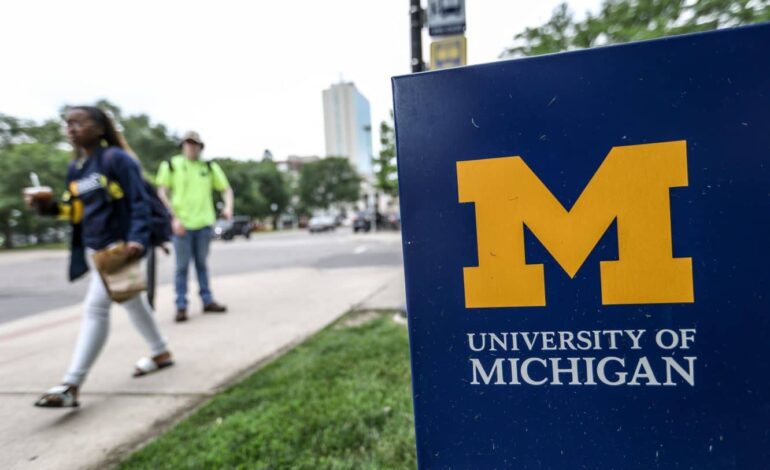ANN ARBOR— Pro-Palestinian activists at the University of Michigan were frustrated by their inability to persuade the university to divest endowment funds from Israel and military-weapons manufacturers, so they came up with an idea: Run a slate of candidates for student government based on a provocative platform. If elected, they’d refuse to fund student groups unless the university complied with their demands. They won — and now they’re carrying through on their threats.
As the fall semester began on Monday, some students worried their groups will have to cut back on their activities unless the university intervenes. Michigan administrators have agreed to provide temporary emergency funding, while making it clear they have no intention of meeting protesters’ divestment demands.
The standoff in Ann Arbor is one of the more striking examples of how protesters are moving beyond disruptions and encampments to embrace new tactics this fall as the war in Gaza roils on.
It’s also an example of how universities are doubling down on efforts to enforce their rules.
In March, students running on a platform called “Shut It Down” were elected to the presidency and vice presidency of the Ann Arbor campus’ Central Student Government, as well as to two dozen other positions as assembly members. In June, the president vetoed the summer budget, which would have provided funding for student groups. The group is expected to attempt to similarly block requests next month when the student government will reportedly vote on applications for fall funding.

Pro-Palestinian “Shut It Down” activists won student government elections last spring and are refusing to fund student groups on campus.
The university’s flagship campus has more than 1,700 registered student groups, many of which apply for and receive awards averaging around $500 to $700 from student government. The student government’s budget of around $1.3 million is distributed among the campus’s 400 active groups and is generated mostly from student fees according to Campus Safety Magazine.
University of Michigan officials have said that divestment is off the table, reports the Chronicle of Higher Education. However, they have agreed to temporarily fund the impacted organizations as long as they agree to reimburse the university.
According to an article published by The Chronicle, a university spokesperson, Colleen Mastony, told The Chronicle writer Katherine Mangan via email that the student government’s new president, Alifa Chowdhury, vetoed a budget resolution the assembly had passed unanimously.
Chowdhury, a Michigan senior, said on Monday that she was too busy for an interview because the new semester’s classes were just beginning. But she shared a statement from the “Shut It Down” group.
“By completely halting all operations and working against the tide of normalcy in the face of genocide, we hope to deliver the message that students elected us to convey,” the statement read. “This institution materially contributing to the mass destruction of Gaza and all 12 of its universities is far worse than not receiving student funding, and students are willing to make this sacrifice in protest.”
According to an article published by The Chronicle on its website on August 26, the University of Michigan is among the schools that have issued warnings to students that they plan to step up enforcement when protests threaten the safety of students or otherwise cross a line. But it’s also emphasizing its support for the right to protest. The university proposed a new policy banning people from interrupting campus events, activities and other university operations after protesters heckled the university’s president, Santa J. Ono, during an honors convocation in March. The proposed policy, which many viewed as a threat to free speech, did not move forward.
University officials have been working on ways to temporarily provide student groups with money to support their activities if their funding requests aren’t approved. Over the summer, student government representatives asked the university’s vice president for student life and dean of students for temporary funding for student groups and “vital student programs that operate from within student government,” Mastony wrote.
“The vice president and dean have notified CSG of their willingness to assist at the request of the assembly and are working to immediately institute a funding process for student organizations to be operated from the Dean of Students office,” the statement read. “CSG would reimburse the university for any funding provided.”
The statement released by Chowdhury said that it’s not up to the new student government leaders to ensure that student groups get the Central Student Government money they apply for. The fate of that funding “lies solely in the hands of the regents, not ours. They have the power to divest, and when they do, CSG funding will resume.”






Leave a Reply